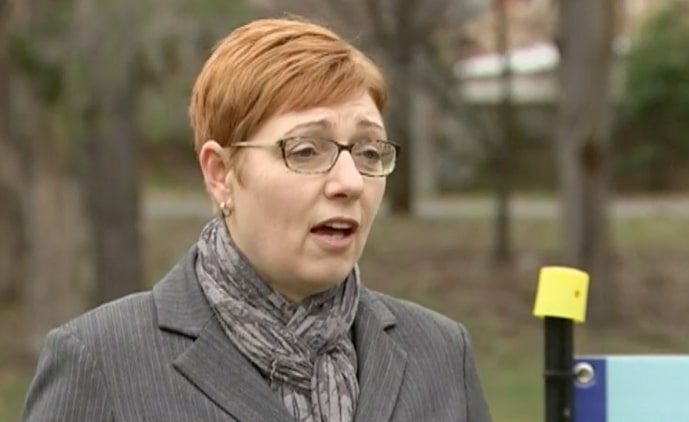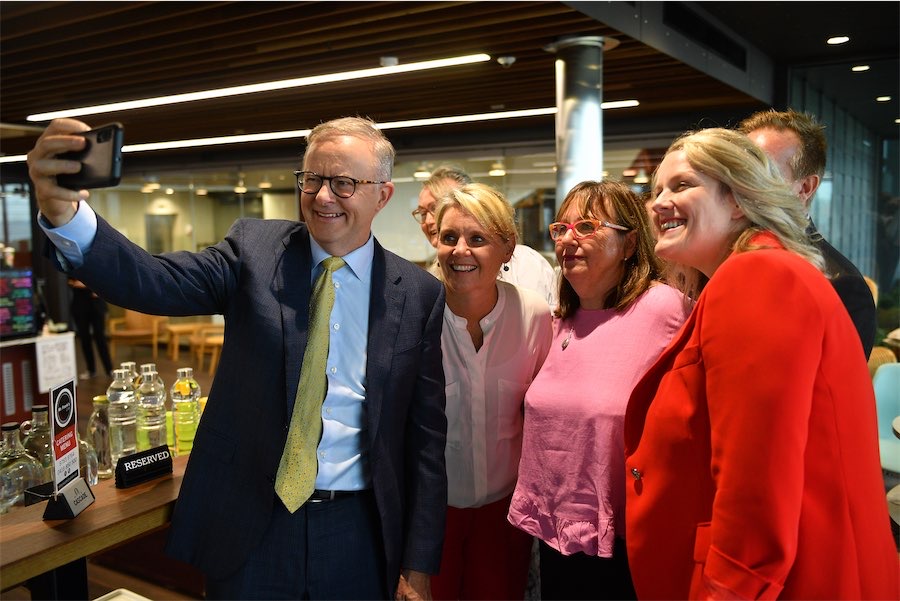Albanese says cabinet is ‘crafting an offer for the second term’ as Minister Ed Husic ponders breaks for business, writes MICHELLE GRATTAN.
A few days ago, after yet more early election speculation, the prime minister was indicating he plans to run full term, which would put the election in May next year, with another budget before it.

On Tuesday, Anthony Albanese told caucus the term was in its final 12 months and “the work of the cabinet is now on crafting an offer for the second term” of the government.
This can be seen as sensible forward planning. Equally, it is further evidence of how politics is now in what’s dubbed the “permanent campaign”.
There’s much less of a sharp distinction these days between election and non-election periods. Politicians are forever on the campaign trail, no one more than Albanese who is constantly travelling the country in what must be an exhausting schedule that inevitably cuts into “thinking” time.
In the “permanent campaign”, politics increasingly bleeds into policy. They were never fully separate, of course, but there comes a tipping point, when policies can be seriously compromised by pursuit of the politics.
In the battle for political advantage, the presentation of policy is carefully managed. So announcements are given out by the government on an embargoed basis, to maximise the chance of getting a clear run in the morning media – a condition of the embargo is journalists can’t get comment from stakeholders, experts or the other side. Years ago, this used to be more limited to actual election campaigns, rather than being standard practice during the period in between.
It’s often said longer parliamentary terms would improve the prospect of governments being able to promote policies that were not so relentlessly focused on the politics. Governments could take hard decisions that were unpopular in the short term, with time for the benefits to be judged.
Given how ingrained the “permanent campaign” has become, it is not clear its habits would be broken by extending the term from three to four years. Regardless, longer terms would require a referendum, and we know that won’t happen.
The 24-hour media cycle promotes the permanent campaign. Today’s media is voracious and both sides are desperate to feed the beast. The Albanese government, with its lists of media appearances sent out daily and more extensive resources, is better at this than the Dutton opposition.
All this frenetic activity produces a lot of junk media and junk politics, with politicians on both sides often just parroting “talking points”.
As the cabinet looks to its second term agenda, ministers will need to bed down, to the extent that is possible, the issues it is still confronting in its first term.
We are in the era of “crisis” politics. We’ve got a cost of living crisis. A housing crisis. A domestic violence crisis. A potential energy crisis (some say). An emerging social cohesion crisis.
None of these crises is going to be solved, or even much reduced, by the time the election comes around. But the government will need to be able to present convincing evidence it is making progress in dealing with each of them. The opposition will require a persuasive spiel that it could meet them better. Peter Dutton’s recently announced immigration policy has been a salutary tale of how things go when you don’t have ready answers to obvious questions.
In crafting that second term agenda, one central question for Labor will be how it pitches its program. With such a slender majority, will the government want to be cautious, as Albanese was in 2022? Or will it present a muscular program, even at the risk of scaring some voters?
A more minor question is what it will do with that long-standing commitment to pursue a republic. Given a referendum for a republic is a bridge too far, will that aspiration be binned or kept in the nostalgia basket? Presumably a second term would not have a minister for the republic, a low-task post now held by Matt Thistlethwaite.
More pertinent, now that Albanese has declared cabinet is focused on the election, is whether the PM is thinking about a reshuffle of his frontbench.
His ministry has been remarkably scandal-free. This is an achievement. Usually by this point in a term, one or two ministers would have come to grief.
But the two years have exposed some poor performers and, despite mostly tight discipline, some differences of view.
Home Affairs Minister Clare O’Neil and Immigration Minister Andrew Giles continue to be weak links, with rolling issues over former immigration detainees and crimes committed by other non-citizens.
The problem is that governments don’t want to put blood in the water by moving ministers who are on the back foot, but a reshuffle in coming months should be considered.
On policy differences, Industry Minister Ed Husic has been the standout. On Tuesday, he used a Financial Review conference to advocate some relief on company tax.
“I believe, in the strongest Labor traditions, we need to be able to bring business and labour together and show that everyone wins.
“That has been the hallmark of previous Labor governments and we need to consider that.
“How we do that – either through corporate tax reform or the way in which we provide investment allowances for the uptick in manufacturing capital – that is something long term, I think, [that] does need to be considered.”
A big question mark for the next election’s competing agendas is what each side will promise on tax, one of the most sensitive hip pocket issues.
Will the government hold out more income tax relief, albeit at the cost of limiting its spending options? And to what extent will the opposition feel the need to provide higher income earners some compensation for the forfeit of part of their stage 3 tax cuts, even at the cost of limiting its ability to offer more to taxpayers further down the income scale?![]()
Michelle Grattan, Professorial Fellow, University of Canberra. Republished from The Conversation.
Who can be trusted?
In a world of spin and confusion, there’s never been a more important time to support independent journalism in Canberra.
If you trust our work online and want to enforce the power of independent voices, I invite you to make a small contribution.
Every dollar of support is invested back into our journalism to help keep citynews.com.au strong and free.
Thank you,
Ian Meikle, editor



Leave a Reply